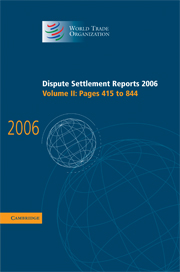Book contents
- Frontmatter
- Contents
- United States - Laws, Regulations and Methodology for Calculating Dumping Margins (“Zeroing”) (WT/DS294): Report of the Appellate Body
- United States - Laws, Regulations and Methodology for Calculating Dumping Margins (“Zeroing”) (WT/DS294): Report of the Panel
- Cumulative List of Published Disputes
United States - Laws, Regulations and Methodology for Calculating Dumping Margins (“Zeroing”) (WT/DS294): Report of the Panel
Published online by Cambridge University Press: 13 December 2017
- Frontmatter
- Contents
- United States - Laws, Regulations and Methodology for Calculating Dumping Margins (“Zeroing”) (WT/DS294): Report of the Appellate Body
- United States - Laws, Regulations and Methodology for Calculating Dumping Margins (“Zeroing”) (WT/DS294): Report of the Panel
- Cumulative List of Published Disputes
Summary
INTRODUCTION
Complaint of the European Communities
On 12 June 2003 and 8 September 2003, the European Communities requested consultations with the United States of America (the “United States”) under Article 4 of the Understanding on Rules and Procedures Governing the Settlement of Disputes (the “DSU”); Article XXII:1 of the General Agreement on Tariffs and Trade 1994 (the “GATT 1994”); and Articles 17.2 and 17.3 of the Agreement on implementation of Article VI of the General Agreement on Tariffs and Trade 1994 (the “AD Agreement”) with regard to certain laws, regulations and methodologies for calculating dumping margins including so-called zeroing. Consultations were held on 17 July 2003 and 6 October 2003, but failed to result in a mutually satisfactory resolution of the matter.
On 5 February 2004, the European Communities requested the establishment of a Panel to examine the matter. This request was revised on 16 February 2004.
Establishment and Composition of the Panel
At its meeting on 19 March 2004, the Dispute Settlement Body (“DSB”) established a Panel pursuant to the request of the European Communities in document WT/DS294/7/Rev.1, in accordance with Article 6 of the DSU.
At that meeting, the parties to the dispute also agreed that the Panel should have standard terms of reference. The terms of reference are, therefore, the following:
“To examine, in the light of the relevant provisions of the covered agreements cited by the European Communities in document WT/DS294/7/Rev.1, the matter referred to the DSB by the European Communities in that document, and to make such findings as will assist the DSB in making the recommendations or in giving the rulings provided for in those agreements.”
On 27 October 2004, the parties agreed to the following composition of the Panel:
Chairman: Mr. Crawford Falconer
Members: Mr. Hans-Friedrich Beseler
Mr. William Davey
Argentina; Brazil; China; Hong Kong, China; India; Japan; Korea, Rep. of; Mexico; Norway; Chinese Taipei; and Turkey reserved their third-party rights.
Panel Proceedings
On 7 February 2005, the Panel received an amicus curiae brief from the Committee to Support US Trade Laws (“CSUSTL”).
- Type
- Chapter
- Information
- Dispute Settlement Reports 2006 , pp. 521 - 828Publisher: Cambridge University PressPrint publication year: 2008

